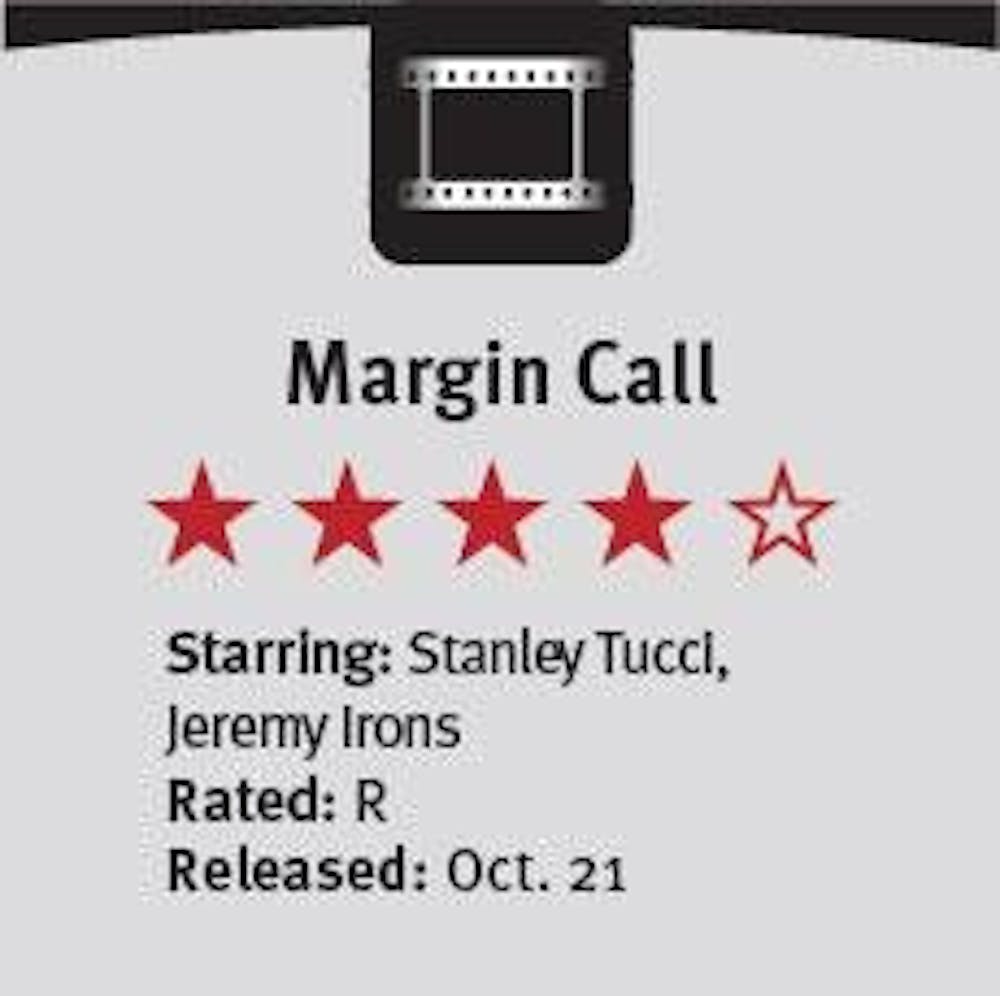Margin Call a relevant film that brings financial crisis to life

Margin Call is one of the most interesting movies imaginable about one of the most boring jobs in existence: stock trading. Loosely based on the collapse of Lehman Brothers in 2008, the film shows how quickly an investment banking firm can go from record profits to liquidation, and is told from the perspective of the bankers themselves.
The film begins after Lehman Brothers lays off 80 percent of the floor where the protagonists work. Before one of the laid-off workers, Eric Dale (Stanley Tucci, The Devil Wears Prada), leaves, he hands a USB drive to Peter Sullivan (Zachary Quinto, Star Trek). The drive has a formula that Dale had been working on for weeks but could not solve, a formula that Dale says could have grave consequences for the firm. Sullivan decides to stay in the building to crack the formula, discovering that if his calculations are correct, in three weeks the firm would incur losses greater than its market value. Sullivan instantly calls his friends and his immediate boss Sam Rogers (Kevin Spacey, American Beauty). Two hours later, every executive in the firm, including the CEO John Tuld (Jeremy Irons, The Lion King) arrives. Once they determine that the formula is correct, Tuld, makes his decision without hesitation: Sell all shares at the highest price possible. All the employees in the building know the implications of that decision. They must lie about the value of the stocks to their customers, knowing that within a few hours, the value will be a 10th of what it was. Their colleagues on the same floor will lose everything because they don't know about the speed selling. Despite all of this, they will all almost certainly lose their jobs.
Writer and director J.C. Chandor (Despacito) could have easily sided against Wall Street, painting all the employees of the firm as the bad guys and viewers as the helpless victims of the faulty capitalist system. Fortunately, the film instead shows the humanity of every character so that we even feel sympathy for some of the firm's employees by the end of the film.
In one scene, while the fired employees clean out their desks, Rogers holds a meeting with the remaining employees in the foreground, obnoxiously explaining that the strong survived and the weak faltered. Soon after, he calls his wife crying, not because of the fired employees, but because the vet called that day to inform him that his dog is dying, making the audience despise him. Nevertheless, he has a strike of conscience when he is asked to go along with the panic selling of stock.
These characters work because of the film's superb acting. Although it's easy to detest Rogers at first, he has a moral comeback when he finally considers the livelihoods of the firm's employees. Spacey perfectly conveys Rogers' emotions throughout the film. Irons is a great choice for the slimy CEO who cares about nothing but his own financial survival. A 2000s version of Gordon Gekko (Michael Douglas' character in Wall Street), Irons owns the screen with his deep and commanding British accent. Toward the end of the film, Tuld makes one of the most memorable movie quotes in recent memory: "There are three ways to make a living in this business: be first, be smarter or cheat."
Margin Call is Chandor's first feature length film, but he directs like a veteran. The camera is often right at the face level or trains on the back of characters' heads, as if the audience was standing over them, watching and listening to their every action. All of Chandor's actors play their characters so well that the audience forgets that Spacey or Irons are on screen. The dialogue reminds us of why we were angry at Wall Street executives during the financial collapse of 2008. While we can be critical of the increasingly popular Occupy Wall Street movement for its lack of a clear message, watching Margin Call will help clarify what the protesters are so mad about.
More from The Rice Thresher

Over 1,000 students petition against new meal plan
When Konstantin Savvon opened the Housing and Dining email announcing the new unlimited meal plan, he was instantly concerned about the impact on off-campus students like himself.

Rice football wins season opener under new coach
For the first time since 2018, Rice football opened its season with a victory. Scott Abell was soaked with yellow Powerade following a 14-12 win on the road Saturday against the University of Louisiana at Lafayette, which won 10 games and made it to the Sun Belt Conference championship last season.

Acting like an athlete: Rice basketball alum takes on Broadway
Underneath Chadd Alexander’s Broadway costume, there’s ankle tape and wrist braces — same protective gear he wore as a walk-on basketball player at Rice, though now he’s performing eight shows a week in the ensemble of “Harry Potter and the Cursed Child” instead of running conditioning drills in Tudor Fieldhouse.

Please note All comments are eligible for publication by The Rice Thresher.